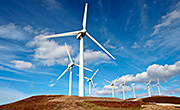
IRS Extends Windpower Developers' Time to Receive Production Tax Credits
On May 5, 2016, the Internal Revenue Service ("IRS") updated guidance regarding the "beginning of construction" requirement for renewable energy facilities seeking to qualify for the production tax credit ("PTC") and the investment tax credit ("ITC") (Sections 45 and 48 of the Internal Revenue Code, 26 U.S.C. §§ 45, 48). Notice 2016-31 ("Notice") extends, from two years to four years, the deadline for developers seeking credits to commence construction of an eligible facility ("Continuity Safe Harbor"), giving windpower developers twice as much time to qualify for credits. The Notice was issued pursuant to the Protecting Americans from Tax Hikes Act of 2015 ("PATH Act") (Pub. L. No. 114-113, Div. Q, 129 Stat. 2242), which extended the PTC for two years with respect to certain facilities whose construction begins before January 1, 2017, and further extended the PTC for wind facilities whose construction begins before January 1, 2020.
Generally, a windpower facility may satisfy the "beginning of construction" test either by: (i) satisfying the Physical Work Test, by beginning physical work on a facility of a significant nature; or (ii) meeting the Five Percent Safe Harbor, by incurring five percent or more of the total eligible cost of the facility. Both of these methods require that the developer make continuous progress toward completion once construction has begun. (See Notice 2013-29, 2013-1 C.B. 1085.)
Previously, the IRS established that the Continuity Safe Harbor would be deemed satisfied if the facility was placed in service within two calendar years subsequent to the year in which construction commenced, irrespective of the amount of physical work performed or costs incurred after satisfying either the Physical Work Test or the Five Percent Safe Harbor. The Notice modifies the Continuity Safe Harbor by extending the amount of time windpower developers have to show they are continuously making progress toward completing the project, from two years to four years, with no particular date by which the facility must be placed in service. Therefore, a taxpayer is deemed to satisfy the continuity requirement if the taxpayer places a facility in service within four calendar years after the calendar year in which the taxpayer began construction.
Additionally, the Notice: (i) modifies the list of "excusable disruptions" to a project, which are barriers to construction that will not be considered as indicating that a taxpayer has failed to maintain a continuous program of construction or continuous efforts to advance toward completion of the facility; (ii) provides that multiple facilities that are operated as part of a single project and treated as a single facility may be disaggregated and treated as separate facilities for purposes of determining whether a facility satisfies the Continuity Safe Harbor; and (iii) that a retrofitted facility can be treated as originally placed in service if the fair market value of the used property is not more than 20 percent of the facility's total value.
The extension is a boon to windpower developers and windpower development generally, as it provides two additional years to qualify for the PTC without establishing a particular date by which an eligible facility must be placed in service. The extension also provides greater certainty with respect to windpower projects seeking to qualify for the credits. Additionally, although the Notice does not provide guidance regarding the PATH Act's extension of the ITC for solar energy facilities, it is expected that a similar notice will be issued for solar energy developers with respect to the ITC.
Lawyer Contacts
For further information, please contact your principal Firm representative or one of the lawyers listed below. General email messages may be sent using our "Contact Us" form, which can be found at www.jonesday.com/contactus/.
Danielle M. Varnell
Washington
+1.202.879.4696
dvarnell@jonesday.com
Gerald P. Farano
Washington
+1.202.879.4691
gfarano@jonesday.com
Louis J. Jenull
Dallas
+1.214.969.3795
ljenull@jonesday.com
Todd Wallace
Dallas
+1.214.969.3713
twallace@jonesday.com
Andrew P. Mina, an associate in the Washington Office, assisted in the preparation of this Alert.
Jones Day publications should not be construed as legal advice on any specific facts or circumstances. The contents are intended for general information purposes only and may not be quoted or referred to in any other publication or proceeding without the prior written consent of the Firm, to be given or withheld at our discretion. To request reprint permission for any of our publications, please use our "Contact Us" form, which can be found on our web site at www.jonesday.com. The mailing of this publication is not intended to create, and receipt of it does not constitute, an attorney-client relationship. The views set forth herein are the personal views of the authors and do not necessarily reflect those of the Firm.

